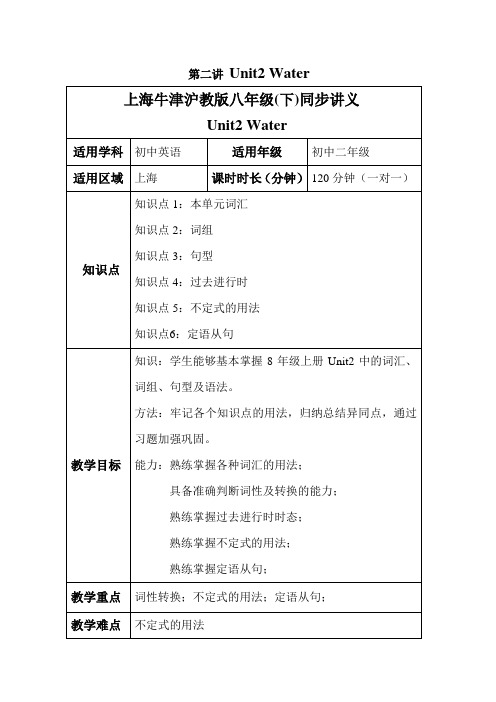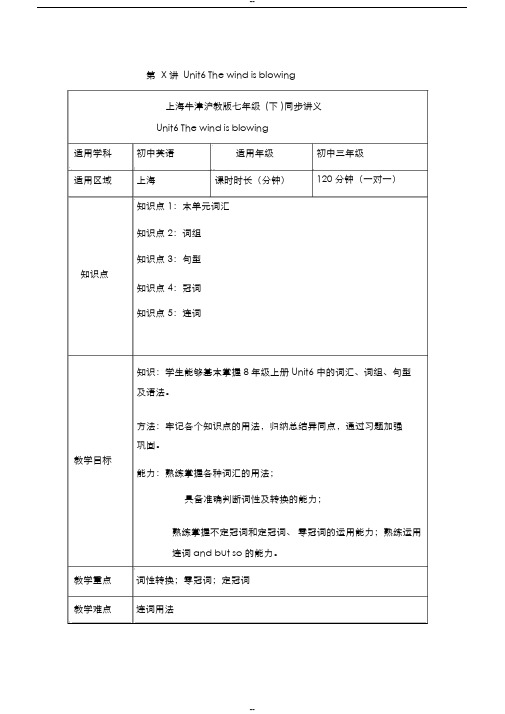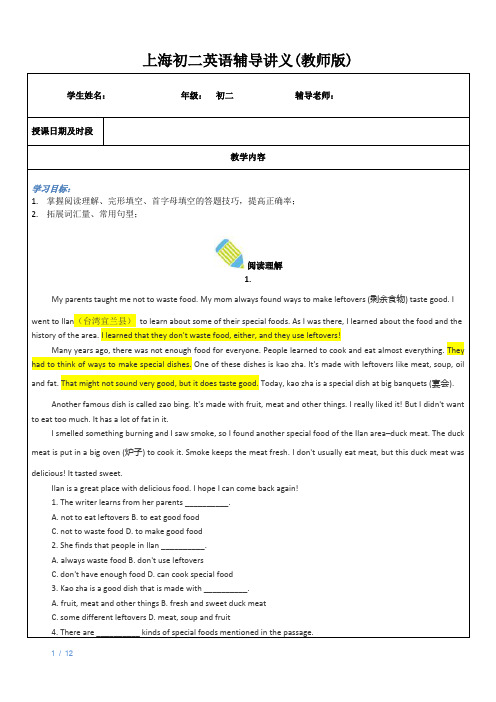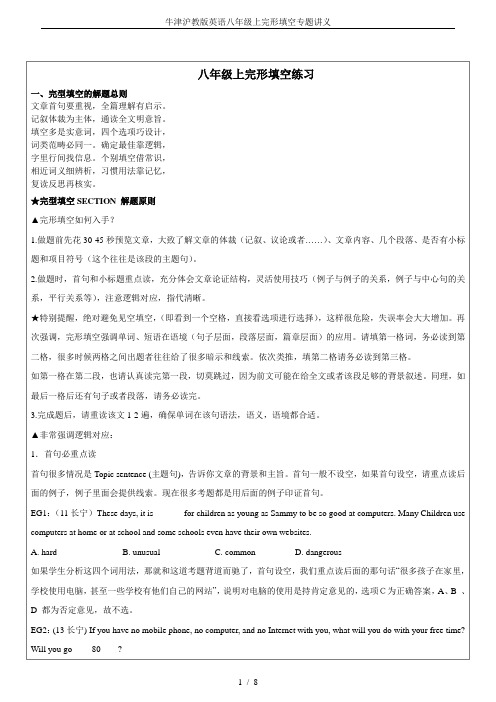上海八年级英语综合练习辅导讲义(教师版)
沪教版初中八年级英语上册期中复习讲义

沪教版初中八年级英语上册期中复习讲义期中复习8AUnit 1 Encyclopaedias一.词语释义。
1.include =have/ be a part of 包括2.die out =disappear 灭绝3.perhaps=maybe=possibly 可能4.nobody =no one= not…anybody没有人5.go for a walk=take/have a walk 去散步6.human being=person 人7.in the countryside=outside the cities and towns 在农村8.however=but 然而9.be born=come out of his/her/its mother’s body 出生10.have the ability to=can 能够做…11.intelligent=wise=clever=smart=bright 聪明的12.for example=such as 例如13.suddenly=quickly and surprisingly 突然地14.more than=over 多于15.the same age as=as old as 年龄一样大16.attractions=places of interest 景点,名胜古迹17.from an early age=when…was very young 在…很小的时候Unit 2 Numbers一.词语释义。
1.realize=get to know=be aware of=understand 意识到2.wise=clever=smart=intelligent=bright 充满智慧的3.check=go over=examine 检查4.copy down=write down=put down=note down 抄写5.prize=reward=a thing that is given to the winner 奖品6. a long time ago=long long ago=once upon a time. 很久以前7.and so on=and so forth 等等8.realize the problem=know something is wrong. 认识到问题9.instruct=teach 指导,教10.copy=a thing made to be exactly like another 复制本11.traffic=cars, buses and people moving along a road and street 交通12.rest= something left 剩余部分13.double=make twice as much 加倍Unit 3 Computer一.词语释义。
上海牛津沪教版八年级(下)同步讲义unit2

第二讲Unit2 Water教学过程一、课堂导入教师讲述一个与本节课题目有关的英文小故事,引出今日所要讲解的知识点,然后让学生简单梳理一下所涉及的问题,带着问题学习本节课的内容。
二、复习预习教师引导学生复习上节课学的重点内容,检测单词的用法,(以提问、回顾的形式进行),针对上节课的作业进行讲评、订正、答疑,并通过英文小故事导入本节课所要学习的新知识。
三、知识讲解1. 知识点一:重点单词1)daily [ˈdeɪli]【词性】adv.【词义】每天【经典例句】Your body needs about two litres of water daily.你的身体每天需要两升左右的水。
2)amount [əˈmaʊnt]【词性】n.【词义】数量;数额【易混淆点】an amount of 大量的,修饰不可数名词a number of 大量的,修饰可数名词【经典例句】When you exercise, the amount of water you need increase.当你锻炼的时候,你身体需要水的量就增加了。
3)increase [ɪnˈkri:s]【词性】v.【词义】增加【易混淆点】increase 增加decrease 减少【经典例句】When you exercise, the amount of water you need increase.当你锻炼的时候,你身体需要水的量就增加了。
4)remain [rɪˈmeɪn]【词性】v.【词义】仍然是;保持不变【易混淆点】remain 仍然是still 仍然;依旧【经典例句】The amount of water you need remains the same.你需要的水还是一样的。
5)symbol [ˈsɪmbl]【词性】n.【词义】符号【易混淆点】symbol 符号signal 标记【经典例句】The chemical symbol for water is H2O.水的化学分子式是H2O。
(上海牛津版)初二英语同步辅导(含同步练习)资料11

(上海牛津版)初二英语同步辅导(含同步练习)资料11Module 4 The natural elements Unit 3 Water Festival[教学过程]重点词汇allow beware contain equal form gatherget on with quest ice-cube iced matter milliliterminus player plus point preparation punch shamesound suitable turn into whilenot only...but also这个连词的意思是“不但…而且…,不仅…而且”,重点在后者。
代词人称不同时,动词随后面的代词。
如:Lu Xun is famous not only in China but also in all the world.He speaks not only English but also French.He not only said it but did it.Not only he but also I am invitednot only …but also… 两个分句时态要一样,当not only置于句首,前一个分句要倒装。
Not only ______ to us the importance of doing the work but they also told us the best way to do it.A. did they explainB. they explainedC. they explainD. had they explainedlook forward to的用法短语动词look forward to(doing)sth. 意为期待着(做)某事,其中的to是介词,而不是动词不定式符号。
如:Boys and girls are looking forward to Children’s Day.孩子们渴盼着儿童节。
(完整版)上海牛津沪教版八年级(下)同步讲义unit6

e.g. There is an“n”in the word“nose”.
有一个字母“n”在单词 “nose”里面。
⑧以u开头的字母的发音以辅音音素开头,前面的不定冠词用a
e.g.a useful book
一本有用的书。
2)定冠词the的用法
①特指某(些)人或某(些)事物
不久他的脸就变红的。
4.知识点四:常见语法
1)不定冠词a / an的用法
①泛指或类指的一个人或物
②表示人的身份或事物的性质
e.g.She is an engineer.
她是一个工程师
③表示数量,有“一”的意思
e.g.There is a dog under the table.
在桌子下面有一只猫
④a / an用在一些习惯用语中
【词性】v.
【词义】使能够,授予权力或方法
15)influence['?nfl??ns]
【词性】n.
【词义】影响,感化,势力
16)culture['k ?lt??(r)]
【词性】n.
【词义】文化(艺术、音乐、文学等的统称)
【易混淆点 】cultural
16)throughout[θru:?a?t]
【词性】prep.
have a look看一看, with a smile带着微笑, take an active part in积
极参加, have a walk散步等。注意:
⑤有些单词首字母虽然是元音,却不是元音音素发音,这些单词前
的不定冠词用a
e.g. a European country一个欧洲的国家, a one-eyed cat一只独眼猫,
上海八年级初二英语辅导讲义(教师版)

上海初二英语辅导讲义(教师版)学习目标:1.掌握阅读理解、完形填空、首字母填空的答题技巧,提高正确率;2.拓展词汇量、常用句型;阅读理解1.My parents taught me not to waste food. My mom always found ways to make leftovers (剩余食物) taste good. Iwent to Ilan(台湾宜兰县)to learn about some of their special foods. As I was there, I learned about the food and the history of the area. I learned that they don't waste food, either, and they use leftovers!Many years ago, there was not enough food for everyone. People learned to cook and eat almost everything. They had to think of ways to make special dishes. One of these dishes is kao zha. It's made with leftovers like meat, soup, oil and fat. That might not sound very good, but it does taste good. Today, kao zha is a special dish at big banquets (宴会).Another famous dish is called zao bing. It's made with fruit, meat and other things. I really liked it! But I didn't want to eat too much. It has a lot of fat in it.I smelled something b urning and I saw smoke, so I found another special food of the Ilan area─duck meat. The duck meat is put in a big oven (炉子) to cook it. Smoke keeps the meat fresh. I don't usually eat meat, but this duck meat wasdelicious! It tasted sweet.Ilan is a great place with delicious food. I hope I can come back again!1. The writer learns from her parents __________.A. not to eat leftoversB. to eat good foodC. not to waste foodD. to make good food2. She finds that people in Ilan __________.A. always waste foodB. don't use leftoversC. don't have enough foodD. can cook special food3. Kao zha is a good dish that is made with __________.A. fruit, meat and other thingsB. fresh and sweet duck meatC. some different leftoversD. meat, soup and fruit4. There are __________ kinds of special foods mentioned in the passage.A. twoB. threeC. fourD. five5. From the p assage, we know that __________.A. there was not enough food in Ilan long agoB. leftovers can't be used to cook delicious foodC. zao bing is a famous dish without any fat in itD. the writer is interested in very big banquets解析:1、C 这是一道细节理解题。
(完整)牛津沪教版英语八年级上完形填空专题讲义

about your work until tomorrow. “Even when I’m watching TV in the evening, I’m always thi nking about my 85 and projects,” says Da vid Paik.Still, hundreds of people around the world start businesses every day, and most enjoy the experience. “There are lots of advantages to having your own business,” says Denise Williams, the owner of a women’s clothing store. “You can decide exactly how to do your work, how much money you want to make, and who will work for you.”80. A) talk about B) listen to C) hear from D) look after81. A) hard B) expensive C) foolish D) strange82. A) As a result B) In addition C) For example D) At last83. A) memorize B) realize C) have D) solve84. A) angry B) funny C) lonely D) sorry85. A) lessons B) holidays C) customers D) friends80. B 81. A 82. D 83. B 84. C 85. C6A jobless man applied for the position of ‘office boy’ at Mi crosoft. The HR (人力资源) manager interviewed him then watched him cleaning the floor as a 80 .“You are employed” he said. “Give me your e-mail address and I'll send you the application form to fill in, as well as the date when you may 81 .”The man replied "But I don't have a computer, neither an email".“I’m sorry”, said the HR manager. “If you don’t have an email, that means you do not exist. And anyone who doesn’t exist cannot 82 .”The man left with no hope at all. He didn’t know wha t to do, with only 10 dollars in his pocket. He then decided to go to the supermarket and buy a 10 kg tomato crate. He then sold the tomatoes in a door to door round. In less than two hours, he succeeded in doubling his money. He repeated the operation three times, and returned home with 60 dollars.The man realized that he could survive (生存) by doing that. He then started to go out early every day, and returned late. 83 , his money doubled or tripled every day. Shortly, he bought a cart, then a truck, and then he had his own fleet of delivery vehicles. Five years later, the man is one of the biggest food retailers (零售商) in the US.He started to plan his family’s future, and decided to have a life insurance. He called an insurance broker (保险经纪人), and chose a protection plan.When the conversation was concluded the broker asked him his email.The man replied, “I don’t have an email.”The broker answered curiously, “You don’t have an e-mail, and yet have 84 in building an empire (企业). Can you imagine what you could have been if you had an e-mail?!” The man thought for a while and replied, “Yes,。
上海牛津沪教版八年级(下)同步讲义unit3

第三讲Unit3 Electricity上海牛津沪教版八年级(下)同步讲义Unit3 Electricity适用学科初中英语适用年级初中二年级适用区域上海课时时长(分钟)120分钟(一对一)知识点知识点1:本单元词汇知识点2:词组知识点3:句型知识点4:情态动词的用法知识点5:宾语从句知识点6:系动词的用法教学目标知识:学生能够基本掌握8年级上册Unit3中的词汇、词组、句型及语法。
方法:牢记各个知识点的用法,归纳总结异同点,通过习题加强巩固。
能力:熟练掌握各种词汇的用法;具备准确判断词性及转换的能力;熟练掌握情态动词的用法;熟练掌握宾语从句的句序;熟练掌握系动词的用法;教学重点词性转换;宾语从句;情态动词;教学难点宾语从句的句序教学过程一、课堂导入教师讲述一个与本节课题目有关的英文小故事,引出今日所要讲解的知识点,然后让学生简单梳理一下所涉及的问题,带着问题学习本节课的内容。
二、复习预习教师引导学生复习上节课学的重点内容,检测单词的用法,(以提问、回顾的形式进行),针对上节课的作业进行讲评、订正、答疑,并通过英文小故事导入本节课所要学习的新知识。
三、知识讲解1. 知识点一:重点单词1)servant [ˈsɜ:vənt]【词性】n.【词义】仆人【易混淆点】servant 仆人service 服务serve 提供服务【经典例句】Why is the servant in the title dangerous?为什么标题中的仆人是危险的?2)electricity [ɪˌlekˈtrɪsəti]【词性】n.【词义】电;电能【易混淆点】electricity 电;电能electrical 用电的【经典例句】Can you get me a package of electricity, please?你能给我一包电吗?3)trick [trɪk]【词性1】v.【词义1】哄骗【词性2】n.【词义2】诡计;花招【易混淆点】trick 哄骗;诡计cheat 欺骗【经典例句】I’ve tricked Daisy at last.我最终哄骗了Daisy。
八年级上册英语辅导学案沪教牛津版

在撰写本文之前,我首先对你提供的主题进行了全面评估。
八年级上册英语辅导学案沪教牛津版是一个广泛且深度的主题,需要详细分析和讨论。
在本文中,我将从简到繁地探讨这一主题,以便你能更深入地理解。
1. 教材介绍八年级上册英语辅导学案沪教牛津版是一本针对八年级学生的英语辅导教材。
该教材考虑到学生的学习特点和需求,设计了丰富多彩的学案内容,包括听力、口语、阅读、写作等方面的练习。
该教材采用了沪教牛津版的教学理念和教学模式,致力于帮助学生掌握英语基础知识并提高语言运用能力。
2. 学案结构八年级上册英语辅导学案沪教牛津版的学案结构合理,内容丰富。
每个单元包括听力、口语、阅读、写作等部分,覆盖了英语学习的各个方面。
学案的设计不仅注重知识点的讲解和练习,还注重培养学生的语言运用能力和学习策略,使学生能够自主学习和自主探究。
3. 教学理念沪教牛津版的教学理念注重学生的主体地位,倡导“以学生为本,激发学生学习兴趣,培养学生学习能力”的教学理念。
这与当前教育改革的方向相符合,有助于激发学生学习英语的积极性和主动性,提高学习效果。
4. 个人观点我认为八年级上册英语辅导学案沪教牛津版是一本优秀的教材,它不仅符合教育教学改革的要求,而且符合学生的学习需求。
在教学过程中,教师应该根据学生的实际情况,灵活运用这本教材,注重培养学生的语言运用能力和学习策略,使学生能够在实践中学会运用英语,而不是仅仅掌握知识点。
在本文中,我从简到繁地探讨了八年级上册英语辅导学案沪教牛津版这一主题,希望能够帮助你更深入地理解这一教材。
我也共享了我对这个主题的个人观点和理解。
希望这篇文章能对你有所帮助。
八年级上册英语辅导学案沪教牛津版是一本深受学生喜爱的教材,它以其丰富多彩的教学内容和合理的学案结构受到了广泛的认可。
学生在使用这本教辅教材的过程中,可以充分感受到教材的贴心设计和对学生学习需求的关注。
接下来,我将从教材对学生的影响、教学方法和教学效果三个方面进行深入探讨。
- 1、下载文档前请自行甄别文档内容的完整性,平台不提供额外的编辑、内容补充、找答案等附加服务。
- 2、"仅部分预览"的文档,不可在线预览部分如存在完整性等问题,可反馈申请退款(可完整预览的文档不适用该条件!)。
- 3、如文档侵犯您的权益,请联系客服反馈,我们会尽快为您处理(人工客服工作时间:9:00-18:30)。
② They have known the matter, haven’t they? (不能用don’t they?) 他们已经知道那事情了,是吗?
四.当陈述句中只含有行为动词时,若动词加了s,就用does, 若动词为原形,就用do,动词为过去式,则用did。
例如:
You cleaned your house last week, _didn’t___ __you__? 你上周打扫了你的房间,是吗?
Your father plays the computer very well, __doesn’t__ ___he _? 你父亲电脑技术很好,是吗?
They look so happy today, _don’t ___ _they___? 你今天看起来很高兴,是吗?
五.反意疑问句的陈述部分带有little, few, never, hardly, seldom,nobody, nothing, barely, scarcely等否定意义的词时,问句部分用肯定式。
如:
①She never tells a lie, does she?(不用doesn’t she?) 她从不说谎,是吗?
②He was seldom late, was he?(不用wasn’t he?) 他几乎不迟到,是吗?
六、反意疑问句的陈述部分为I am……时,问句部分习惯上用aren’t I?表示。
如: I am a very honest man, aren’t I? 我是个很诚实的人,是吗?
七.陈述部分的主语为不定代词something, anything, nothing, everything时,问句部分的主语用it。
如:①Something is wrong with the computer, isn’t it? 电脑有问题了,是吗?
②Nothing has happened to them, has it? 他们什么事也没发生,是吗?
八、陈述部分的主语为不定代词somebody (someone), anybody (anyone), nobody (no one), everybody (everyone)时,问句部分的主语用he或 they,这时问句动词的数应和he或 they一致。
如:①Someone has taken the seat, hasn’t he? 有人已经坐了位置,是吗?
②Everyone has done their best in the game, haven’t they? 每个人在比赛中已经尽力了,是吗?
九.陈述部分为祈使句
1)若为let’s引导,反问句用shall we? 例如
Let’s go home together, shall we? 让我们一起回家,好吗?
2)若为let us引导和其余的任何一般的否定祈使句,都用will you.
例如 Let us stop to rest, will you? 让我们停下休息,好吗?Don’t make any noise, will you? 别弄出噪音,好吗?3)一般的肯定祈使句则用will you 或won’t you 都行。
例如: Do sit down, won’t you?/ will you? 请坐,好吗? You feed the bird today, will you? 今天你喂鸟,是吗?Please open the window, will you? (won’t you?) 打开窗,好吗?
十:陈述部分为There (Here) + be + 主语时,问句部分用动词+there (here)?形式。
①There are two cakes on the plate, aren’t there? 碟子里有两块蛋糕,是吗?
②Here is a story about Mark Twain, isn’t here? 这是关于马克吐温的故事,是吗?
十一、肯定反意疑问句回答
当陈述部分为否定式,反意疑问句为肯定式时,其回答往往与汉语不一致,需特别注意:
"It isn’t cheap, is it?" "Yes, it is." “它不便宜吧?”“不,很便宜。
”
"He doesn’t love her, does he?" "No, he doesn’t."“他不爱她,是吗?”“是的,他不爱她。
”此时,"Yes"即不,对前面"It isn't cheap."的否定。
十二:否定反意疑问句的回答
当陈述部分为肯定式,反意疑问句为否定式时,其回答一般不会造成困难,一般只需照情况回答即可:
"It’s new, isn’t it?" "Yes, it is." “是新的,对吗?”“对,是新的。
”
"He wants to go, doesn’t he?" "No, he doesn’t."“他想去,对吗?”“不,他不想去。
”此时,"No"即是,对前面"It's new."的肯定。
回答反意疑问句的原则
回答反意疑问句通常应根据实际情况来确定,
“It is a beautiful flower,isn't it?”“It isn't a beautiful flower,is it?”肯定均为“Yes,it is."否定为“No,it isn't."
十三:快速记忆表
反义疑问句练习题
一、单项选择
1、Few of them hurt themselves in the accident last night,________ A. don’t they B. didn’t they C. did they D. do they
2、 -You’ve never seen dinosaur eggs, have you ?
--_____. How I wish to visit the Dinosaur World.
A. Yes, I have
B. No, I haven’t
C. Certainly, I have
D. Of course, I haven’t
3、His sister had a bad cough, ______she? A. wasn’t B. doesn’t C. hadn’t D. didn’t
4、Mr. Green went to Shenzhen on business last week,________? A. isn’t he B. doesn’t he C. didn’t he D. hasn’t he
5、John can hardly understand any Chinese, _________he? A. Can’t B. doesn’t C. can D. does
6、Don’t smoke in the meeting-room,_________? A. do you B. will you C. can you D. could you
7、Lucy, you clean the blackboard today,_______ A. do you B. did you C. will you D. can you
8、Miss Cheng will never forget her first visit to Canada ,________? A. will she B. won’t she C. isn’t she D. wasn’t she
9、The lady couldn’t say a word when she saw the snake,________?
A. could the lady
B. couldn’t the lady
C. could she
D. couldn’t she
10、----________sweater is this? ----I think it’s Peter’s. A. Who B. What C. Which D. Whose
11、---______I go and meet you at the airport? ---No ,thanks, dear . I can take a taxi home.。
